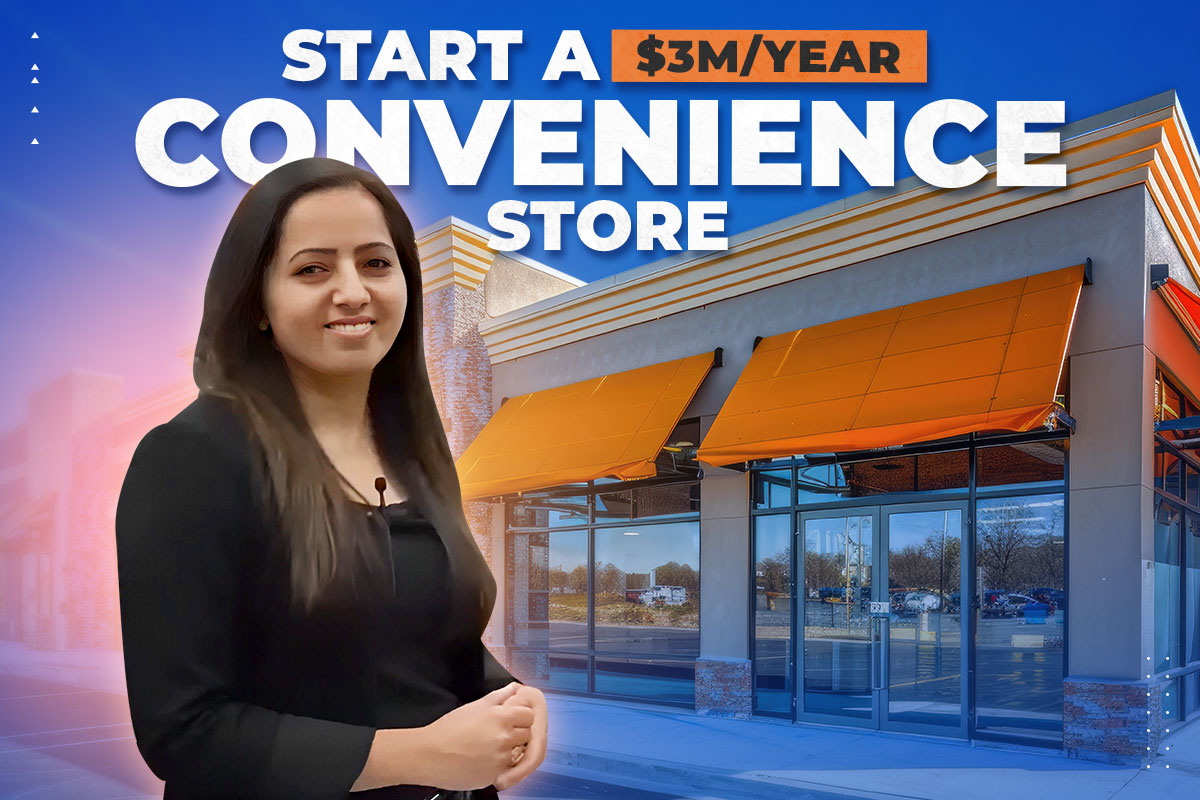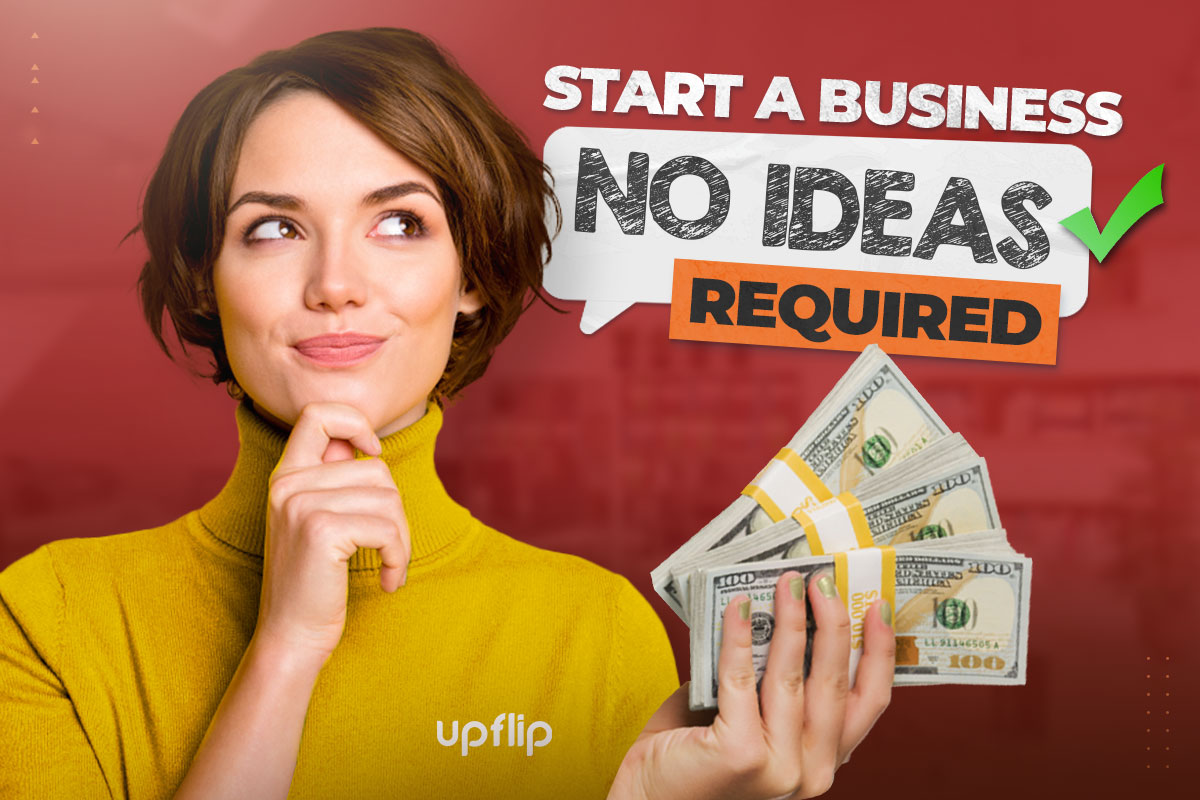Did you know that you can earn $37 million annually from a convenience store in just five years?
In this blog, Parm Bhullar explains how to open a convenience store and quickly scale to more locations. We’ll dive into the exact steps Parm and her eight business partners used to start a convenience store empire that now earns a minimum of $250K in monthly revenue.
We’ll share the costs to start a convenience store and explain how to make a convenience store profitable. We’ll also discuss using your business plan to get a small business loan and the strategies you’ll need to buy products and build customer loyalty.
Let’s get started. You can either keep reading or click any of the links below to jump to the section that interests you:
- Case Study: Parm Bhullar and Partners
- Learn About Convenience Stores
- Options for Opening a Convenience Store
- Licenses You Need to Open a Convenience Store
- How to Successfully Open and Run a Convenience Store
- Step #1. Create a Store Business Plan
- Step #2. Select a Good Location
- Step #3. Focus on Financial Management
- Step #4. Reward Your Customers
- Step #5. Maintain a Clean Store
- Step #6. Monitor Your Competition
- Step #7: Invest in Good Technology and Systems
- Step #8: Understand Your Customers
- Step #9: Understand Product and Consumer Trends
- Step #10: Manage Purchases Well
- Financing a Convenience Store
- The Bottom Line
Case Study: Parm Bhullar and Partners
Parm Bhullar runs a family business with her husband, three other couples, and a silent investor. They pooled together 15 years of savings to get the $1M down payment to open their first convenience store in 2019.
Later that year, they bought another one. Now, they own eight and make $37 million in revenue per year. She explained:
She explained that approximately 60% of sales come from the store and that you can increase customer satisfaction by always asking if there was anything the customer couldn’t find. When they tell her something, she orders it to have it for next time.
She provides these insights and more in our interview below:
Learn About Convenience Stores
According to the National Association of Convenience Stores, there are over a million convenience stores worldwide that generate $906 billion a year in sales. The United States boasts over 152,000 convenience stores, or approximately one store for every 2,187 people.
How much does it cost to open a convenience store?

You should expect to spend several hundred thousand or millions of dollars to open a convenience store. The cost of opening a c-store varies tremendously and depends on a number of factors like:
- Square footage
- Location
- Foot and car traffic
- Equipment
- Initial product mix and inventory level
Parm’s first location required $1M upfront for the down payment on the loan. In addition, they have $15K to $20K in monthly overhead for each store, plus the costs of gas and products to sell.
One of the biggest startup costs for opening a convenience store will be inventory. Inventory costs will be driven to a large extent by the number of SKUs (stock keeping units) that you choose to sell, which in turn is largely driven by the size of your store.
Other startup costs to include in your budgeting are:
- Equipment such as shelving
- Point-of-sale systems
- Refrigeration
- Licenses and permits
- Remodeling and repairs
- Security systems
- Signage
You’ll want to price out these costs beforehand. If you find any excessive costs, or you think you’ll have trouble obtaining enough financing to fund these startup costs, then reconsider your decision to buy in the near future.
How much does a convenience store make?
The average convenience store makes $906,000 per year, or $75,500 per month. That doesn’t mean that’s all you can make, though. Parm told us:
The average revenue across Parm’s locations is over $385K monthly, which means they are earning approximately five times more per month than the average convenience store.
Is owning a convenience store profitable?

Yes, a convenience store can have operating profit margins of around 25%. However, the exact figure depends on the location, number of customers, your markup, business structure, and financing costs. Parm explained:
How much do convenience store owners make?
The average convenience store owner makes $44,193, with a range between $22,000 and $60,500 annually. In addition, they may claim profits that are typically 5% to 10% of revenue, according to the point-of-sale system Toast.
Just to give you an idea, that means that each of Parm’s partners could be getting between $205.5K and $308K annually, assuming they have average profit margins. Converting that to a single store would be between $25.7K and $38.5K per partner. For a solo owner of a single store, that would be around $231K to $347K.
The Pros and Cons of Owning a Convenience Store

While you’re researching how to open a convenience store, you’ll want to carefully weigh the pros and cons of c-store ownership. We’ve summarized the main ones below.
Pros
- Freedom: By working for yourself, you’ll join the ranks of 33.2 million small business owners.
- Regular customers: In general, convenience store customers are locals who live somewhere in the neighborhood. Over time, they become regular visitors. This reduces the need to constantly attract new customers and provides consistent business for your store.
- Financial stability: Although they sometimes have low margins, convenience stores don’t generally experience the same financial highs and lows associated with economic booms and busts.
- Relatively easy to start: Compared to many businesses such as restaurants, convenience stores are fairly straightforward to set up once you’ve identified what you need.
Cons
- High turnover: Staff issues can eat into profit margin in the form of training time, mistakes, inventory theft, and illegal actions such as not checking ID for alcohol or tobacco sales.
- Security and safety: Historically, convenience stores have been common targets for theft and crime.
- Inventory losses: Convenience stores are particularly prone to inventory losses both through theft and product spoilage. These challenges require constant management and result in lower margins.
- Long hours: If you’re an independent owner, you may find yourself having to work long hours to keep margins intact. This is especially true during your first two to three years in business. Many customers expect to be able to go into a store late at night or early in the morning seven days a week.
- Startup costs: It can cost typically between $50,000 and $100,000 to start a convenience store. However, these numbers can go as low as $10,000 (unlikely) and up to $1 million (if you have deep pockets). A lot of your startup expenses will go toward initial inventory, rent, deposits, and equipment.
You might consider starting a food truck if you’d like a business with lower upfront costs.
Options for Opening a Convenience Store
There are three options for owning a convenience store:
- Buy an independent store.
- Buy a branded convenience store.
- Start a convenience store.
Option #1. Buy an Independent Store

There are many advantages to buying an existing c-store. Depending on the store’s exact business situation, they can include:
- An existing customer base
- Financial history and other key market information (e.g., foot traffic, rent history, and product data)
- Ability to learn how to run the business from the existing owner
- Potential to purchase the business at a discount (e.g., if the owner wants to retire) and improve margins with better management
- No need to negotiate a new lease, supplier contracts, and other contracts
- Licenses and permits already in place
- Existing employees who know what to do
Despite these potential advantages, you should recognize that a store is often for sale because it’s losing money or the financial payback isn’t worth it to the owner. You’ll need to understand the true reason the small business is for sale.
If you are buying a convenience store, as with any small business, you’ll need to do some due diligence. For more about what this entails, read our article about how to buy a business. Some questions to investigate are:
- Has all equipment been inspected and maintained on a consistent schedule? How old is it?
- Is the point-of-sale system modern and up to date? Does it track inventory and produce a balance sheet? Is it secure?
- What is the customer demographic? Do they have disposable income?
- How many vendors are there to manage, and what are the contract terms?
- Is the store profitable? How can you be sure? Have the financials been audited? Can you live off those financials?
- If there are gasoline pumps on the property, have they passed inspection recently?
- What are the best-selling products? If they are cigarettes and alcohol, are you comfortable with those kinds of products being the bulk of your sales?
These are just a few examples of questions you’ll need to ask. After you’ve gathered this type of information, you may find that you prefer to start a convenience store from scratch.
Option #2. Buy a Branded Store
Roughly 37% of c-stores are part of a chain such as 7 Eleven or Circle K. There’s a good reason for this. A branded convenience store has many benefits, but the single greatest advantage is having an established brand name.
The parent company provides you with guidelines and procedures for operating under their brand. Some may include inventory lists as well. Chains also pay for national or regional marketing and advertising.
Parm told us:
Branded convenience stores provide many benefits over starting a store from scratch:
- Lower startup costs
- Faster time to profitability
- Guidance and support for both startups and ongoing operations
- National marketing and increased visibility
Meanwhile, some of the risks are:
- Lack of control over the brand
- Reliance on the financial strength of the parent company
Option #3. Start a Convenience Store

The advantages and disadvantages of starting your own convenience store from scratch are the opposite of purchasing an existing store. You’ll have total control over:
- Vendor and product selection
- Choice of location
- Lease negotiation
- Store layout and equipment
- Profit margins
Parm discourages using this strategy because it has the highest risk of the three and is likely to cost the most.
Licenses You Need to Open a Convenience Store
Typically, you’ll need the following licenses and permits to run a convenience store include:
- Sales tax permit
- Employer identification number
- City or county business license
- Occupancy permit
- Alcohol and tobacco license
- Health and safety permits
- Lottery license
- Gas permits (i.e., EPA inspection)
Obtaining these permits requires money and time. For example, to obtain a health permit, you and your employees will likely have to take a food safety course. Likewise, to obtain an occupancy permit, you have to ensure that your building and facilities are up to code.
The U.S. Small Business Administration (SBA) is a good place to find out what permits you’ll need. You should also ask the current owner if you are purchasing a convenience store.
How to Successfully Open and Run a Convenience Store

When you’re operating a small business on fairly thin margins, it’s critical to use every trick you can to manage your operations with profit in mind. Next, we’ll discuss a 10-step process to increase your chances of successfully running your convenience store.
Step #1. Create a Store Business Plan
You’ll need to pay attention to your margins while running a convenience store. Take the time to do market research and create a business plan. In fact, you’ll need to put together a business plan if you require bank financing to open or buy your store.
Opening a convenience store using a business plan will help you be more successful. When you put together your plan, you’ll gain an understanding of your market, competitors, and customers.
You’ll have to investigate business drivers such as foot traffic, pricing and product mix. You’ll also need to understand how these factors interact to drive revenue.
Part of creating your plan will involve estimating your startup needs and operating costs. You’ll have to put it all together in the form of financial forecasts that can demonstrate to a bank (and to yourself) that you understand how to manage your margins.
Check out our blog about how to write a business plan for more information.
Step #2. Select a Good Location
No matter how great your product mix, what your pricing is, or how much you advertise, you can’t succeed without the right location. If you choose a location that doesn’t bring you a lot of customers looking for “convenience,” then your store will continue to struggle. Parm explained:
She also explained that the traffic to a location impacts whether the locations are open 18 or 24 hours per day.
How do you find foot traffic numbers?

There are several ways you can gauge traffic for a location:
- Sit outside and count customers for several hours (or pay someone to do this).
- Get this information from the existing store owner.
- Ask the landlord.
- Ask other nearby businesses.
- Use a service like Outscraper to pull data directly through Google Maps.
If you get foot traffic numbers from a landlord or the current store owner, make sure to verify that those numbers are correct.
What else makes a good c-store location?
You don’t want your store to be surrounded by alternative stores such as a larger grocery or chain pharmacy store. Your storefront should also be visible instead of hidden in an alley or behind an office building.
A good location is one where you can get regular customers from surrounding neighborhoods, a large office complex, or a school zone. Your location should also have ample and convenient parking and be easily accessible. As you’re searching, consider future construction projects or other factors such as seasonality that might affect traffic patterns.
Remember that more traffic always means higher rent. Do the math in your business planning to make sure the higher rent is worth it. Parm told us:
Another factor that’s specific to convenience stores is theft and robberies. Since convenience stores are common targets, you’ll want to investigate if the building is secure. Remember to consider the surrounding neighborhood’s crime rates and income profile.
Step #3. Focus on Financial Management
Be financially proactive, and don’t wait for problems to crop up. Study individual product margins and tweak your pricing accordingly. Parm suggests requesting distributor lists of top-selling products to make your decisions.
Part of the financial management is done through the systems she uses, which vary depending on the brand of gas station. Arco uses Verifone software, while Shell uses an S2K system. Both track inventory.
She also recommends monthly audits of in-store inventory and checking pumps every four hours for tampering. Document the results in a log book.
In a business based on high volumes and low margins, you’ll always be trying to optimize between sales volumes and price. Sometimes, a $0.10 discount on a soda can increase convenience store sales by 300%.
Step #4. Reward Your Customers

Approximately 80% of Parm’s business is from repeat customers who live nearby, while 20% is from people passing through. She told us:
Offering customer rewards and great customer service encourages people to keep coming back to your store.
Step #5. Maintain a Clean Store
One of the drawbacks of a convenience store is that it sees high volumes of people every day. This makes it hard to keep bathrooms, floors, and trash cans clean.
Having clean food spaces and bathrooms is especially important for your store’s reputation and customer loyalty. Think about it. Would you eat a hot dog from a place that has a dirty bathroom or leaves spilled nacho cheese on the floor?
Step #6. Monitor Your Competition
In the convenience store business, customers do care about prices because they know they’re paying a premium every time they go into a store. If the store a block down sells coffee for $0.99 and you’re selling it for $1.19, you could be losing customers because of the higher price.
You either need to have much better coffee or another advantage that makes it easy for customers to justify the price difference. For example, if your store is much cleaner and offers a loyalty program, more customers will be willing to pay $0.20 extra at your store.
Step #7: Invest in Good Technology and Systems

It’s critical to have a modern point-of-sale system for security and financial management. A point-of-sale system helps you manage and keep track of sales, calculate store profit, and more.
In addition, you’ll want to invest in the best anti-theft and security equipment. CCTV cameras, alarms, and cash register monitors help you prevent losses.
Step #8: Understand Your Customers
It’s easy to just say that everybody’s your customer given the common nature of convenience stores across the country. This is a big mistake.
Due to the huge variety of products you could sell, the more you understand your potential customer base, the easier and less expensive it will be to stock the shelves. Your goal should be to identify products that sell at attractive margins and high volumes.
Think about the people who come into your store on a regular basis. An example would be adults who stop in for coffee and a donut every day on their way to work.
You may also have customers from the local neighborhood who come in for a sense of community. If so, you want your interior to be inviting. You could also offer seating to eat meals and train employees to be extra friendly.
If your customers don’t linger and tend to rush in quickly on the way home, you’ll want to put the most popular products like milk and bread in an easily accessible location. Make sure to have enough staff at busy times and a quick payment system.
It’s also important to understand the demographic of your convenience store customers. Businesspeople may want you to stock the New York Times and have cell phone chargers in a ready-to-grab location. Meanwhile, construction workers may want cold drinks and good deals on ready-to-eat food.
Some customer groups may overlap. For example, school kids might want a great candy selection, but they’re likely to visit your store with their parents. Stocking items that appeal to parents allows you to capture both demographics.
Step #9: Understand Product and Consumer Trends
Remember a couple of years ago when fidget spinners were flying off the checkout counter of every convenience store? New always sells.
Keeping on top of what’s selling and what isn’t will help you stay in front of new trends. Some good industry resources for tracking trends in the c-store industry include:
In addition, it’s a good idea to be a member of convenience store trade associations:
- National Association of Convenience Stores
- American Petroleum and Convenience Store Association
- National Association of Truck Stop Operators
- State associations for convenience stores
Step #10: Manage Purchases Well

A big part of running a convenience store is how you manage inventory purchases. Inventory management drives your margins.
If you purchase a convenience store, you’ll inherit a set of vendor relationships and associated products, which may or may not be a good thing. As part of your business planning, you’ll want to take a look at some of the biggest vendor contracts to determine if they’re fair. There might be room to negotiate and improve margins, working capital, or your product mix.
You’ll purchase most of your inventory through wholesalers and distributors. These may be wholesalers who carry nearly all the inventory you want or vendors who specialize in different types of products.
You’ll likely carry at least 2,000 inventory items at your convenience store. Parm suggests carrying the top 10 products from the major categories like chips, candy, soda, and beer.
Generally, your vendor choices should be driven by customers’ product choices. It’s also a good idea to work with multiple vendors to encourage competitive pricing and meet customer needs. If you’re opening up a convenience store from scratch, you’ll have to identify wholesalers and SKUs you want to sell yourself.
Vendors will also conduct a credit check. If you have poor credit, you’ll find yourself in a not-so-great negotiating position. At any rate, most vendors will require you to pay upfront for your first order.
Financing a Convenience Store
Prospective convenience store owners will often seek financing because stores can cost millions to start. Make sure your business plan and financial projections are prepared before you seek loans or other types of financing.
There are several common options for financing the startup and operating costs of a convenience store. The types and availability of financing for your convenience store will depend in part upon the specific loan you want to take out.
There are various loan purposes to consider as a borrower depending on what you want to accomplish. You may want to purchase an existing business or make improvements to a convenience store you already own.
SBA Loans
A good place to start looking for financing is by contacting your bank to see if they can arrange a Small Business Administration loan. The SBA’s 504 and 7(a) loan programs are both popular alternatives.
The SBA backs typically 75% of the full loan amount so that banks and lenders assume less balance sheet risk on the loan. Loan terms are structured based on the assets being financed.
Conventional Loans

Conventional loans are typically made by traditional banks and some non-bank lenders. These loans aren’t guaranteed by any third party, and the bank or lenders assume the full risk of the loan.
Therefore, credit standards are usually higher for conventional loans, but pricing and terms can be more flexible. Lenders can offer better terms for stronger loan requests.
Keep in mind that when you seek financing from a bank, you must have good credit and be willing to put up about 15% to 20% of the startup costs.
Asset-Backed Loans
Convenience stores often use asset-based lines of credit for a variety of business needs. Asset-based financing can be either a revolving or term loan that is secured by assets such as accounts receivable, real estate, equipment, or inventory.
Seller Financing
For buyers of an existing convenience store, it may be possible to negotiate financing with the seller. If you don’t have great credit or a lot of money to put down, this is a great option for opening your own convenience store.
With this kind of financing, instead of receiving the full purchase amount, the seller finances all or part of the purchase price. You negotiate the interest rate and terms with the seller instead of a bank or lender.
One benefit of seller carry financing is that the seller will be supportive of the transition. They should offer training to ensure that you’re successful in taking over the business.
Merchant Cash Advance

Merchant cash advance financing is based on credit card receivables. The merchant cash provider will advance funds based on historical performance or credit card sales.
This financing works well for businesses like convenience stores that have a large volume of credit card sales. Merchant cash is considered short-term financing and can be funded quickly.
The Bottom Line
Starting a convenience store takes money and time. With careful planning and research, you can eventually earn a good living after opening your convenience store. It’s all about finding the right location and putting the right products on the shelves at a competitive price.
So which is it? Will you stick with your 9 to 5 or go for the 7 to 11 at your new convenience store?





